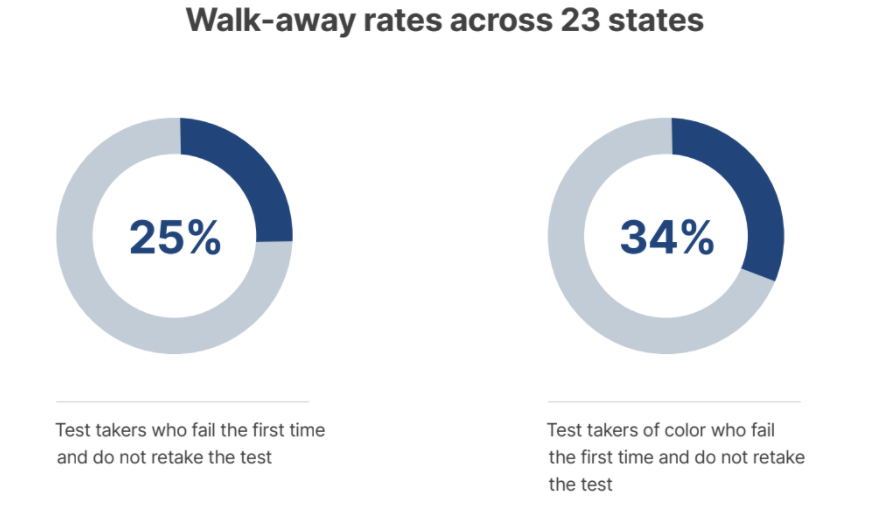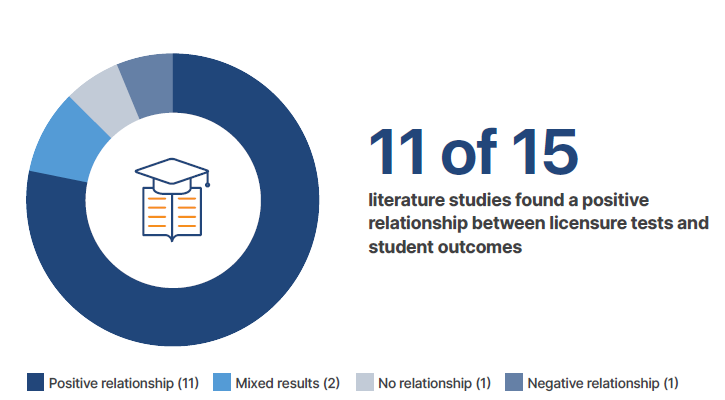Teachers cannot teach what they do not know.
On this sentiment, surveys show there is near-universal agreement. What’s more, the field agrees that elementary teachers should be expected to demonstrate their knowledge of the subjects they will teach before becoming a classroom teacher. A recent E4E survey shows that 98% of teachers believe that their colleagues should be held to this expectation,193 and NCTQ surveys show that 84% of leaders from prep programs and 95% of leaders from state education agencies agree.

The most common measure of teachers’ content knowledge—teacher licensure tests—suggest that something is amiss in elementary teacher preparation. In many states, new data (soon to be released by NCTQ) demonstrate that less than half of test takers are prepared to pass the first time they take an elementary content test. Already more likely to be disadvantaged by an inequitable system of K-12 education, the number of aspiring teachers of color prepared to pass on the first attempt are even lower.
If candidates persisted until they did pass, perhaps the low pass rate on the first attempt would not matter as much. However many do not. In fact, a quarter of elementary test takers who fail on their first attempt do not retake the test in the three-year window analyzed by NCTQ, and this rate rises to a third of all test takers of color!

Some people think these results justify replacing licensure tests with alternative approaches that often lack the advantages of licensure tests: validity (the tests address the content teachers need), reliability (the tests’ scoring process is standardized and consistent), comparability (all aspiring elementary teachers in the state take the same test), efficiency (the time and cost for both the test takers and graders are limited), and comprehensiveness (the tests address a broad range of topics). Replacing licensure tests with approaches that do not offer the same guardrails would only perpetuate a negative cycle, sending more teachers into the classroom ill-equipped to provide their students with a rich foundation across a range of subjects.
Licensing exams are crucial for the health of the profession. While the job of teaching is complex and multi-faceted and no single assessment could fully measure or predict who will be effective, licensure tests fare surprisingly well in studies of predictive validity. Though not as broadly studied as the issue merits, among the studies that exist, most have found a positive, statistically significant relationship between elementary teachers’ performance on licensure tests and their effectiveness in the classroom.
A review of thousands of studies on licensure tests found only 15 that directly address the question of whether teachers’ performance on licensure tests is related to their effectiveness in the classroom. Nearly all of the 15 studies found a positive relationship. For more on this body of research, see this project’s FAQs.

Certainly licensure tests (and any other measure!) should be rigorously and regularly vetted for evidence of bias, and to ensure that they represent an inclusive view of the knowledge that elementary teachers need. (For more on the process testing companies have in place to identify potential bias, see the FAQs.) But as with tests throughout students’ K-12 years, low pass rates on teacher licensing tests may be accurate measures of the systemic inequities in our education system. The answer, then, is not to stop measuring, but rather to right the inequities—in part by better supporting teacher candidates of color.
Licensure tests offer a guardrail for the profession, ensuring that teachers enter the classroom with an adequate grasp of the subjects they will be expected to teach. Information gleaned from these licensure tests can offer a compass, guiding efforts to strengthen and diversify the teacher workforce.
Stay tuned for NCTQ’s landmark release of elementary content licensure test pass rate data, coming July 2021.
Learn more about this project and explore frequently asked questions at www.nctq.org/review/passrates.
More like this

The importance of content knowledge for elementary teachers
Elementary teachers need to know the content they will teach.

The opportunity to learn from teacher licensure pass rate data — and why it matters
Strengthening our teacher workforce begins with better, more transparent data.


